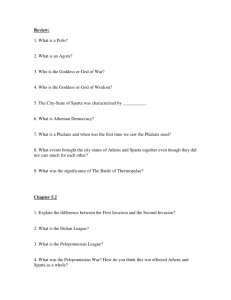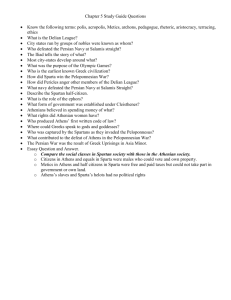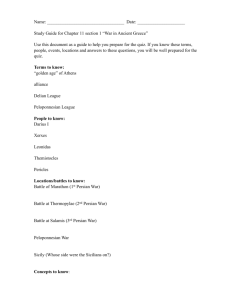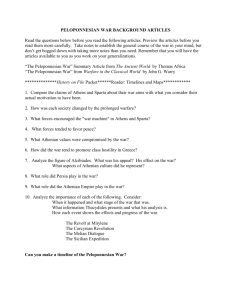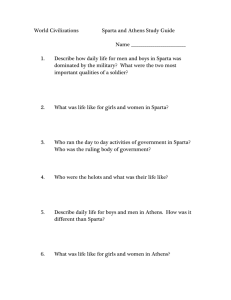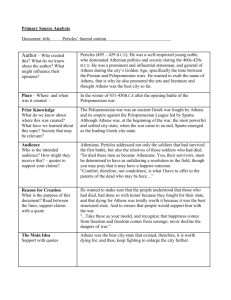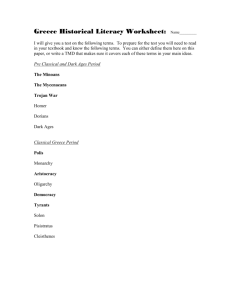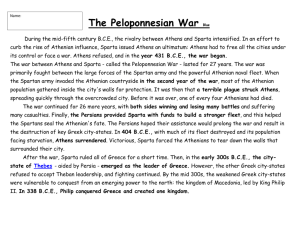Social Studies Education
advertisement
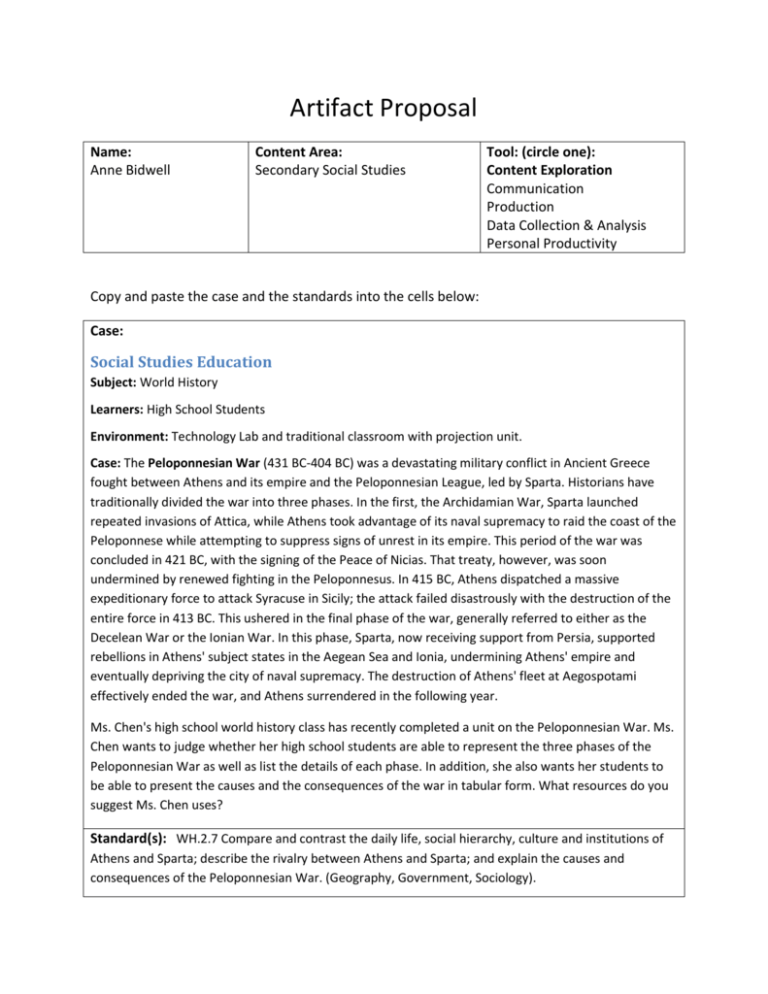
Artifact Proposal Name: Anne Bidwell Content Area: Secondary Social Studies Tool: (circle one): Content Exploration Communication Production Data Collection & Analysis Personal Productivity Copy and paste the case and the standards into the cells below: Case: Social Studies Education Subject: World History Learners: High School Students Environment: Technology Lab and traditional classroom with projection unit. Case: The Peloponnesian War (431 BC-404 BC) was a devastating military conflict in Ancient Greece fought between Athens and its empire and the Peloponnesian League, led by Sparta. Historians have traditionally divided the war into three phases. In the first, the Archidamian War, Sparta launched repeated invasions of Attica, while Athens took advantage of its naval supremacy to raid the coast of the Peloponnese while attempting to suppress signs of unrest in its empire. This period of the war was concluded in 421 BC, with the signing of the Peace of Nicias. That treaty, however, was soon undermined by renewed fighting in the Peloponnesus. In 415 BC, Athens dispatched a massive expeditionary force to attack Syracuse in Sicily; the attack failed disastrously with the destruction of the entire force in 413 BC. This ushered in the final phase of the war, generally referred to either as the Decelean War or the Ionian War. In this phase, Sparta, now receiving support from Persia, supported rebellions in Athens' subject states in the Aegean Sea and Ionia, undermining Athens' empire and eventually depriving the city of naval supremacy. The destruction of Athens' fleet at Aegospotami effectively ended the war, and Athens surrendered in the following year. Ms. Chen's high school world history class has recently completed a unit on the Peloponnesian War. Ms. Chen wants to judge whether her high school students are able to represent the three phases of the Peloponnesian War as well as list the details of each phase. In addition, she also wants her students to be able to present the causes and the consequences of the war in tabular form. What resources do you suggest Ms. Chen uses? Standard(s): WH.2.7 Compare and contrast the daily life, social hierarchy, culture and institutions of Athens and Sparta; describe the rivalry between Athens and Sparta; and explain the causes and consequences of the Peloponnesian War. (Geography, Government, Sociology). 1. Standard: a) Explain the standard or learning goal of the lesson in your own words To be able to describe the comparisons and differences of the Athens and Sparta and their contention. They also need to be able to clearly explain the war and the reasons it happened and the conclusion. b) What is the technology side of the problem that needs to be addressed? The students need to explain these things in a tabular form. c) Write a learning objective that relates to the standard/learning goal and the technology problem. NOTE: Need to revisit this at each step. Using online and textbook research, creating group presentations, and making the quiz together as a class, the students will be able to clearly identify the three phases of the war, the details of each phase, and the causes and consequences of the war by not scoring less than 85% on the quiz. 2. Needs: What do you need in a resource or tool? a) Learners: Explain characteristics of learners (Grade level/ Gender/ Socioeconomic status/ Culture and ethnicity/ Existing knowledge of content/ Motivation/ Learning style/ Special needs/ Technology literacy) 10th graders/ 15 Females, 10 Males/ Middle to upper class/ 20 White, 4 AfricanAmerican, 1 Asian-American/ Little existing knowledge/ High motivation (honor class)/ Learns easily/ No special needs/ High technology literacy b) Learning Environments Student Grouping: Individual/group work/whole class? Group work- 5 groups of 4, and 1 group for 5 Time: How much time needed for this lesson? 5 class periods and possibly outside work Resources: Describe the resources needed in the classroom environment Do you need teacher computer, projector, textbook, computer lab, etc.? Teacher computer, projector, textbook, computer lab, PowerPoint, paper resources Media: Describe the sources of information needed - Do you need any CD, DVD, pictures, maps, etc. (text/audio/image/audio +image) Possibly- internet, DVD, pictures, PowerPoint, etc. 3. Options: a) What resources can you access that might address the problem? Resource Name Where can you find it? How could you use it? Laconian Professionals http://www.laconia.or g/gen_info_literature/ Peloponnesian_war.ht m The Outbreak of the Peloponnesian War http://www.muckety. com/The-Outbreakof-the-PeloponnesianWar/5055860.mucket y http://www.indiana.e Lysistrata at the IU du/~thtr/2002/lysistra Theatre and Drama ta/war.html Center http://mappinghistory Mapping History .uoregon.edu/ LucidLan- GodsWar http://www.lucidlan.c Online: The Two om/article.php?id=15 Hostile Factions 75 Athens and Sparta Explained This website is a good informational website that describes the war, why it happened and the different phases- even goes past the first 3 they need to know about. This is a map of the outbreak of the Peloponnesian War- it’s interactive, you can click to activate and then click on names to explore and expand. The students can go watch this play at IU that is actually about Sparta and Athens: the Peloponnesian War This has been designed to provide interactive and animated representations of fundamental historical problems. Athens and Sparta are two hostile factions present in GodsWar Online. Players have to choose a side when creating characters. The Athenians worship Athena and give their city a name deriving from Athena, while the Spartans are much braver under the protection of Ares. Players in different factions can launch PK or make a certain contribution to their polis b) Which three resources are you the least familiar with? Resource Name GodsWar Online URL with info on how to use http://gw.igg.com/main.php Mapping History maphist@uoregon.edu Lysistrata at the IU Theatre and Drama Center http://www.indiana.edu/~thtr/ 4. What to use? a) Which of the tools you identified should be used? Laconian Professionals, Mapping History, textbook, other online or book research b) How should these tools be used? (Provide a brief description of the activity) There are six different groups- each group will get a topic (Athens, Sparta, Phase I, Phase II, Phase II, Causes/Consequences of the Peloponniesan War). Each group needs to cover their topic in great detail, provide a class presentation (they may choose if that’s a powerpoint, skit, class discussion, etc), and give the teacher three quiz questions in which the entire class will be asked all of the questions on a graded quiz at the end of the unit. I will allow the groups appropriate time on the computer to research and give them a sheet with suggestions of websites (including Laconian Profs and Mapping History). c) Provide links to existing examples of teacher or student work related to these tools or the activity you decided to use. Existing Example URL Brief Summary http://www.eduplace.com Questions that the students might come up to ask /ss/socsci/ca/books/bkf3/ their peers. reviews/pdfs/LS_6_12_02. pdf d) What would you need to create in order to make this activity possible? (Example: Tutorial, interactive quiz, job aid, rubric, online forum, online survey) Rubric, Instruction sheet, Website Suggestions sheet, Powerpoint for lecture on this before they start their projects. e) Are there any foreseeable problems in using this? Problem How it could be addressed 5. WhY to use? How does the approach you chose address… a) Effectiveness? The students doing their own research and writing their own quiz questions will allow them to really take in the material. Giving them creative freedom to decide how to present their project enhances the lesson because it causes them to think. b) Efficiency? Researching online is faster than reading some irrelevant information in the text. c) Enhancement? d) The goals (technology problem and learning objective you identified) For the students to fully understand the 3 phases of the war and the details of each phase, as well as the causes and consequences of the war by explaining clearly to the class and scoring at least an 85% on the quiz. Grading Rubric: completed by reviewer & instructor Question A. SNOWY questions answered... 0 3 With adequate Superficially or detail and with with components no components missing missing Points Comments 5 In significant detail and with no components missing Describes approach not connected to learning goal Describes approach connected to learning goal but approach not described in sufficient detail Describes approach connected to learning goal and approach described in sufficient detail C. Tool use... Missing Present but not significantly connected to learning goal Present and significantly connected to learning goal D. Spelling / Grammar Major spelling and grammar mistakes No or only minor spelling grammar mistakes NA E. Professional Language Unprofessional language used No unprofessional language used NA F. Organization Poor formatting make answers difficult to read Formatting used to make answers easier to read NA G. Feedback Incorporated? No (0), Yes (1) B. Proposed artifact... Total: /25
